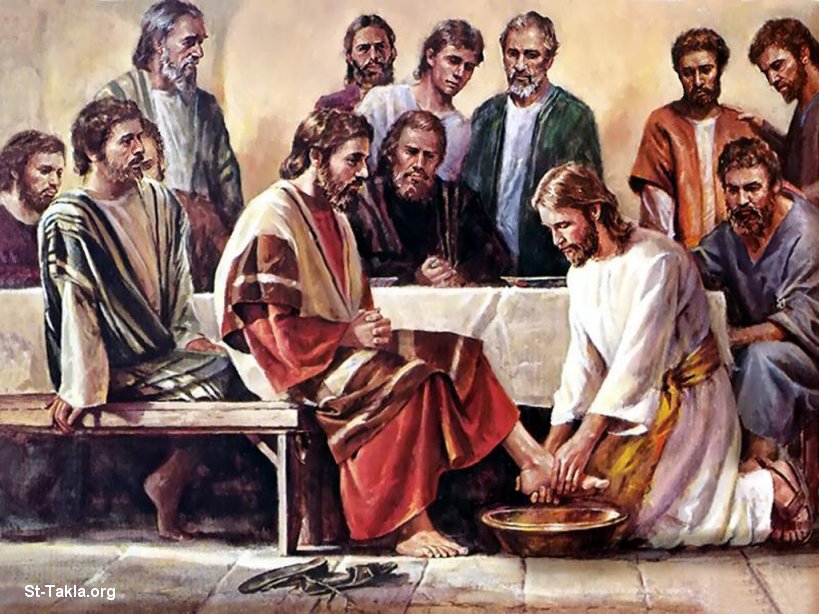Reflection
for Holy Thursday
Mass
of the Lord’s Supper
(Ex
12:1-8, 11-14; 1Cor 11:23-26; Jn 13:1-15)
Today we begin the Easter Triduum in which we
celebrate the Institution of the Eucharist and the ministerial priesthood, the
Crucifixion and the Resurrection of our Lord Jesus Christ. It can be described
as one elongated celebration with specific
pulses. In this evening celebration, the first reading reminds us of the
Passover meal, prepared with an unblemished lamb, with which God delivered
Israel from Egypt. The Second reading talks about the new Passover meal in the
Body and Blood our Lord Jesus Christ, which is given to us until the Lord comes
again. The Gospel narrates the scene at the Last Supper where Jesus washed the
feet of His disciples.
The washing of feet was known in the tradition
of Israel. It was used to welcome guests or when one returns from a journey. And
this was done before one settled down to eat (cf. Gen 18:4, 19:2, 24:32). It
was in the position of slaves to wash the feet of their masters when the return
or when a guest comes (1 Sam 25:41). Based on this tradition, Jesus repudiated
Simon the Pharisee saying, “I came into your house, and you poured no water
over my feet...” St Paul used washing of feet to demonstrate the kind of
service to be rendered to God’s people. It was quite dramatic and amazing as Jesus
suddenly began to wash the feet of His disciples. This act He performed that
evening points to His person and mission.
He laid aside His
garments, and tied
a towel round Himself. This was how He put aside His glory and assumed our
lowly state. “Who, being in the form of God, did not count equality with God
something to be grasped. But He emptied Himself, taking the form of a slave...”
(Phil 2:6-7). He tied the towel, ready for work, like a servant ready to serve
his master (cf. Lk 12:35-36). At the heavenly banquet, those servants who
washed the feet of their master shall receive the kind of service Jesus gave to
the disciples. “In truth I tell you, he will do up his belt, sit them down at
table and wait on them” (Lk 12:37).
“Then He
poured water into a basin, and began to wash the disciples’ feet, and to wipe
them with the towel that was tied around him.” Imagine the surprise on their
faces, and the reluctance with which the stretched forth their legs! This is
one of those occasions where Jesus challenged the tradition of the Jews. Washing
of feet was done by servants before one enters inside the house, and before he
eats. Thus, the disciples needed to be washed
before they could enter into the new life of the Resurrection. This washing
will draw its effectiveness from the washing
flowing from the side of Jesus on the Cross. Therefore, this washing has a
Eucharistic dimension, and is an integral expression of Jesus’ total
self-offering on the Cross for our
cleansing. He took the position of a servant, and was humbler yet, even to accepting death, death on a cross
(Phil 2:8).
Jesus has to assume the position of a servant
so that His servants can become masters! But Peter echoed the voice of common
humanity who had not been schooled in this humility, “Lord, do you wash my
feet?...You shall never wash my feet.” His objection exposed our struggle to
pull from grace and be human. Here Peter’s
humility rejected Jesus’ humility.
But how can we learn to be humble if we are not docile at the Master’s humility,
even unto the cross? So Jesus said, “If
I do not wash you, you have no part in me.” We must allow Jesus to save us so
that through us others can be saved.
“If I then, your Lord and Teacher, have washed
your feet, you also ought to wash one another’s feet.” He gave the instruction that the disciples
should imitate Him. Thus, Christ’s faithful must acquire this habit of humility
before others. This entails rendering service to them and attending to their
needs. But most importantly, it involves washing
their feet that they may be able to enter and dine with Jesus. We must help
people live a Eucharistic life, a
life pleasing to God. This will make us
appear like servants at the Eucharistic
gate to wash the feet others that they might have a part in Jesus. As the
living example Jesus gave today anticipates His Cross, and draws its
effectiveness from there, so also shall our actualization of this example in
the lives of others be a moment of cross, and our sharing in the Cross of
Christ Jesus.
There are so many feet to wash! Our hearts have
traveled far from home; some people can no more trace their way back.
Psychological and emotional crisis are in the increase. There are lots of
socio-economic and health conditions today that demand urgent intervention. Washing these feet is not to wipe out
these problems, but for us to have a part in Christ Jesus, and help others to
experience the example Jesus gave us.
Fr Jude Chinwenwa Nwachukwu, C.Ss.R
Saints Peter & Paul Catholic Church,
Tedi-Muwo, Lagos.
Thursday April 9th, 2020.
Holy Thursday.
